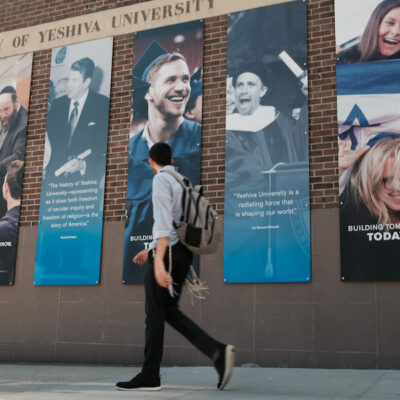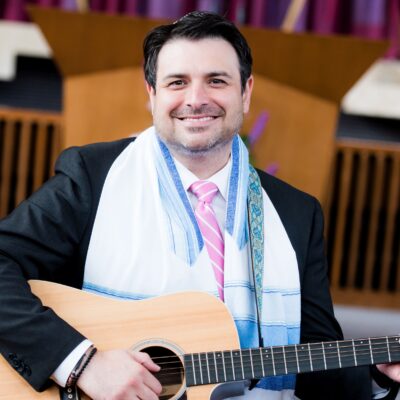RABBINATE 2.0
Atra, Russell Berrie Foundation teach N.J. rabbis entrepreneurial skills to meet a new generation’s demands
Initiative is meant to better prepare clergy for the types of activities they are facing and expected to face in the future

Atra/Facebook
Illustrative. Atra fellows brainstorm ideas during a session in 2022.
When Rabbi Jeremy Ruberg first heard about a regional fellowship geared toward teaching rabbis new methods to better serve their communities, he jumped at a chance to update what he views as “Rabbinate 2.0.”
Ruberg, the rabbi for lifelong learning at Temple Emanu-El in Closter, N.J., is one of 11 cross-denominational fellows embarking on the Atra Northern New Jersey Rabbinic (re)Design Fellowship, an 18-month program that seeks to enhance Jewish life in the area by offering rabbis new skills and methods to reach their communities.
Atra, the organization initially launched as the Center for Rabbinic Innovation, modeled this inaugural regional fellowship on its national fellowship. Funded by the Teaneck, N.J.-based Russell Berrie Foundation, the program is part of a wave of efforts to impart rabbis with skills inspired by entrepreneurs, aimed at helping them navigate the rapidly evolving realities of contemporary Jewish life.
“Right now, the demands on rabbis are more than they’ve ever been,” said Rabbi Shira Koch Epstein, Atra’s executive director.
Idana Goldberg, CEO of the Russell Berrie Foundation, said her organization’s studies in New Jersey had shown contradictions. Northern New Jersey had one of the most affiliated Jewish populations in the country, yet many people said they were still searching for spiritual meaning. In focus groups with rabbis, the community’s spiritual leaders expressed that they “haven’t necessarily been trained on a lot of the things they’re being asked to do.”
“We heard loud and clear that the rabbis in northern New Jersey did not have a mechanism for connecting with each other on a regular basis,” Goldberg told eJewishPhilanthropy.
Citing research Atra commissioned in 2022, Epstein told eJP that the vast majority of Jewish adults want a relationship with a rabbi, but the expectations of how to achieve that relationship are changing. Epstein said fewer people are likely to assume that an institution such as a synagogue will meet their needs for connection. Even though she disagrees with that assessment, it has become clear rabbis needed more training on how to reach people outside of traditional structures. According to Goldberg and Epstein, these needs have become even more acute since Oct. 7.
So Atra is drawing on lessons from entrepreneurs. Similar to a Honey Foundation initiative in Israel, the fellows will focus on leadership development skills and community-building strategies that can help them adapt to changing norms.
The New Jersey fellows have already had their initial meetings. Atra is treating this regional program as a pilot, and may use lessons from it to expand the idea to other regions.
Ruberg enters the fellowship with three specific areas where he wants to feel more comfortable.
“I’d like to be more prepared with issues pertaining to fundraising, social media and mental health and well-being for families and adults and children of all ages,” he said.
He said he enjoyed learning approaches from the worlds of business and education, but rarely had time in the course of his day-to-day work to stay up to date on the latest ideas.
In the fellowship, Atra will teach the fellows the concept of “minimum viable projects,” which Epstein called “a lean start-up method adapted to a Jewish context and framework.” The lesson from the business world is targeted not at “customers” in this instance, but at building spiritual connection.
“We take the theory,” she said, “and we adapt it to actually be applicable to this venture of spiritual connection to God and Torah and the Jewish people.”
What is a feasible initiative that could make a tangible difference in their community? How do they go about crafting those efforts and putting them into action?
Zvika Krieger, the spiritual leader of Chochmat HaLev, a progressive community in Berkeley, Calif., was part of Atra’s national fellowship program for rabbinic entrepreneurs.
“There’s a new generation of rabbis trying to meet people where they’re at,” Krieger told eJP, himself an example of a leader working outside the traditional synagogue model.
Having spent much of his career in the Silicon Valley world, he grasped the start-up approach, but still came away with a useful education in building Jewish community.
He found a well-meaning fundraising establishment that often didn’t see the parts of the community that weren’t as engaged with Jewish life. The people sitting on boards of foundations, Krieger said, tend to be people for whom the current models of Jewish community are working.
Eventually, Krieger developed a consistent preamble to his presentations for established Jewish organizations.
“What I’m pitching may not resonate with you,” Krieger said he tells potential funders, “but it’ll probably resonate with your children or your grandchildren.”
Generational differences run through many of the fellowship’s goals. Both Epstein and Goldberg said rabbis have been overwhelmed by increased needs for services and connection since the Oct. 7 attacks in Israel.
“Since Oct. 7,” Goldberg said, “there’s been a rise of Jews who have woken up and said, ‘I need a Jewish community but don’t necessarily know what that means.’”
Handling that surge of important but stressful interactions is a skill in and of itself. Epstein said the fellowship is also a chance for rabbis to share notes, to feel less alone and more secure in their career choice.
“We’re helping rabbis reconnect with their vision,” she said. “We’re giving them opportunities to get coaching and peer support and be in community with each other, to think about how to be more effective in their jobs, and we’re helping them feel like this is a profession as well as a calling that matters — because they’re seeing how their work is actually making change towards what they hope for for the Jewish people, as opposed to going from task to task to task.”
For many rabbis, like Ruberg, the chance to simply reinforce their knowledge is a welcome gift.
“I think rabbis are being asked to do more and more around skill sets that they don’t fully have,” he said. “We have them, but you don’t have the time to hone them, and I think it’s time to get them sharper.”

 Add EJP on Google
Add EJP on Google









